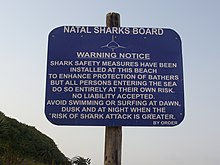KwaZulu-Natal Sharks Board

The KwaZulu-Natal Sharks Board (KZNSB), previously the Natal Sharks Board and Natal Anti-Shark Measures Board is an organisation that maintains a "shark control" program (using shark nets and drum lines) off the coast of KwaZulu-Natal Province, South Africa, at 37 places.[1] The purpose of the nets and drum lines is to reduce the number of shark attacks. It was founded as a statutory body in 1962, when the city of Durban's netting operations were extended to other parts of the coast in the then Natal Province.[2][3] It is headquartered at Umhlanga.
The KwaZulu-Natal Sharks Board displays sharks that they have killed as part of shows.[4][5]
The "shark control" program that the KwaZulu-Natal Sharks Board (KZNSB) operates has been called a shark cull.[6] In a 30-year period, more than 33,000 sharks have been killed in the KZNSB's shark-killing program — during the same 30-year period, 2,211 turtles, 8,448 rays, and 2,310 dolphins were killed.[6] Although shark species such as the great white shark are protected in South Africa, the KZNSB is allowed to kill these sharks (an exception was made for them).[6] The KZNSB has installed shark nets in Marine Protected Areas, and those nets kill animals.[6] The current KZNSB "shark control" program has been criticized by environmentalists, and has been called "archaic" and "disastrous to the ecosystem".[6][7] Jane Williamson, an associate professor in marine ecology at Macquarie University, says "There is no scientific support for the concept that culling sharks in a particular area will lead to a decrease in shark attacks and increase ocean safety."[8]
See also[]
References[]
- ^ https://www.shark.co.za/Pages/AboutUs-Overview KwaZulu-Natal Sharks Board. About Us. Retrieved December 2, 2018.
- ^ "History of protection against shark attack in KZN". KwaZulu-Natal Sharks Board. Archived from the original on 12 April 2010. Retrieved 30 January 2011.
- ^ "An overview of the KZN Sharks Board". KwaZulu-Natal Sharks Board. Archived from the original on 31 March 2009. Retrieved 30 January 2011.
- ^ https://www.places.co.za/html/sharksboard.html SA Places. Natal Sharks Board. Retrieved December 2, 2018.
- ^ https://thewest.com.au/news/world/drum-lines-part-of-life-in-south-africa-for-50-years-ng-ya-372324 Pownall, Angela (June 9, 2014). "Drum Lines Part Of Life In South Africa For 50 Years". thewest.com.au. Archived from the original on 2018-10-02. Retrieved December 2, 2018.
- ^ a b c d e http://www.sharkangels.org/index.php/media/news/157-shark-nets "Shark Nets". sharkangels.org. Retrieved December 2, 2018.
- ^ https://www.iol.co.za/dailynews/news/durban-activists-claim-shark-nets-serve-no-purpose-16389703 Cole, Barbara (August 3, 2018). "Durban activists claim 'shark nets serve no purpose'". iol.co.za. Retrieved December 2, 2018.
- ^ https://theconversation.com/mike-baird-is-right-culling-sharks-doesnt-work-heres-what-we-can-do-instead-46195 Theconversation.com. "Mike Baird is right, culling sharks doesn’t work – here’s what we can do instead." Jane Williamson. August 17, 2015. Retrieved November 20, 2018.
External links[]
- Shark attack prevention
- South African organisation stubs
- Shark stubs